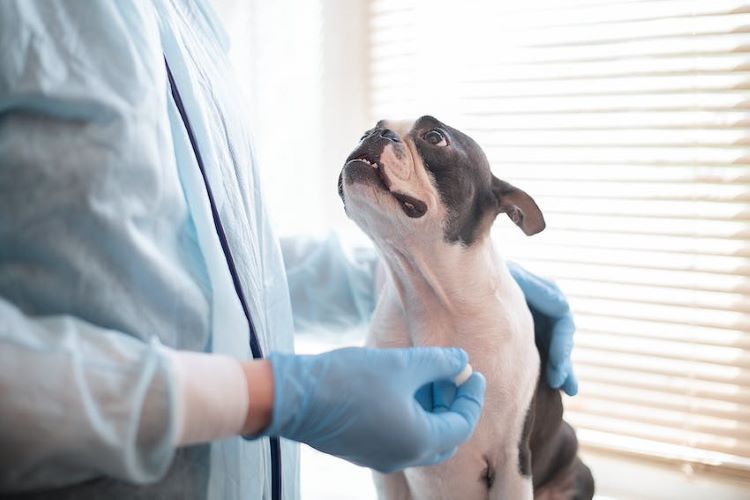Ready to help treat your pet to a healthy life?
Heartworms: How to Protect Your Pet
By : Trupanion Staff | Updated Apr 3, 2025

The heartworm (or Dirofilaria immitis) is a variation of roundworm, transferred by mosquitoes and one of the more dangerous parasites found in pets. Heartworms in pets is a serious health condition that can be difficult to treat once it progresses. So it’s important to be aware of common symptoms and prevention tips.
Quick facts about heartworms
- Heartworms are thread-like worm parasites that look like pale spaghetti at maturity.
- The heartworm parasite can affect both cats and dogs.
- Dog have been diagnosed with heartworm disease in all 50 US states and in Canada.
- Unlike other parasites, the heartworm can only be passed on by mosquitoes.
- Some studies have shown that 25% of cats infected with heartworm are indoor-only pets.
How heartworms infect pets
The heartworm is one of the only mammal-dwelling parasites to be transmitted exclusively by mosquitoes. While other common parasitic worms are transferred via feces, heartworms cannot be passed directly from one host to another. Pets that spend time outdoors — particularly in mosquito-heavy environments — are at highest risk of heartworm, but indoor animals can become infected as well.
Infection timeline
- A mosquito bites an animal infected with heartworm and microscopic baby worms, known as microfilaria, are transferred to the mosquito.
- Microfilaria grow and develop into ‘infective stage’ larvae over the next 10 to 14 days.
- The infected mosquito then bites your pet, transferring developed larvae into the bloodstream.
- The larvae grow into adult heartworms over the next six months and can then live in the host animal for up to 7 years.
Heartworm in dogs vs. cats
Heartworm infection affects both dogs and cats, but there are significant differences in how the disease manifests and how it is managed in each species.
In dogs, for example, heartworm disease typically presents with symptoms such as coughing, exercise intolerance, lethargy, and difficulty breathing. As the disease progresses, dogs may develop a swollen abdomen due to fluid accumulation, and in severe cases, they can suffer from heart failure. Left untreated, heartworm disease can be fatal for most canines.
On the other hand, heartworm infection in cats often presents with more subtle symptoms or may even be asymptomatic. Some cats may exhibit coughing, vomiting, weight loss, or difficulty breathing, while others may show no outward signs of illness. Unlike in dogs, the presence of adult heartworms in cats does not always lead to heart failure. Instead, complications such as respiratory distress syndrome can occur, which may be sudden and severe. Diagnosing heartworm infection in cats can be challenging, as traditional tests designed for dogs may yield false negative results in felines. Additionally, there is no approved treatment for adult heartworms in cats, making prevention even more crucial.
Preventing heartworm disease in both dogs and cats involves administering monthly preventive medications, which are highly effective at killing heartworm larvae before they can mature into adult worms. Regular testing for heartworm infection is also recommended, especially for cats, to ensure early detection and appropriate management. Ultimately, while heartworm disease poses serious risks to both dogs and cats, understanding the differences in how the disease affects each species is essential for effective prevention and management strategies.
How dangerous are heartworms?
As with many parasitic worms, blood loss is a serious risk for pets with heartworms. In the most severe cases of heartworms in pets, blood loss can lead to extreme lethargy, high blood pressure, and ultimately heart failure.
It is imperative that you immediately take your cat or dog to a veterinarian if you notice signs of uncharacteristic tiredness, difficulty breathing, weakness of body, bloody diarrhea, or collapse.
An electrocardiograph heart scan carried out by your veterinarian may reveal unusual rhythmic behavior, as well as any heart swelling or abnormalities. Spotting these signs early on could be the difference between health and suffering, or even life and death, for your pet.
Signs of heartworm in pets
There are three severity levels of heartworm disease in cats and dogs, and the signs and symptoms associated with each can be quite different. The severity of your pet’s infection can be assessed by the level of symptoms they show signs of. According to the Merck Veterinary Manual, the classes of heartworm disease in pets are as follows:
- Class I heartworm disease — Animals will often show no symptoms at all with Class I heartworm disease, but there could be minimal indicators such as a mild cough. While Class I is the least severe form of the illness, the fact that the stage is asymptomatic (shows no symptoms) can make it difficult to spot. This makes it harder to treat in good time.
- Class II heartworm disease — This form of the parasitic infection is associated with a more severe cough, and often a reluctance to engage in physical activity. Dogs and cats with this level of infection may be lethargic, and even the most playful pets may become unwilling to run or play.
- Class III heartworm disease — This is the most severe form of heartworm illness. Your pet will appear very unwell. Symptoms include anemia, intolerance to exercise and sometimes fainting. On closer inspection by a veterinarian, a Class III patient may also be found to have high blood pressure and an abnormal heart rate.
There is also a Class IV, but that is specifically used to indicate Caval Syndrome. This is a form of heart failure caused by severe heartworm infestation blocking bloodflow to the heart.
Heartworm treatment
Heartworm treatment starts with parasite prevention. While young heartworms (microfilariae) can be killed off at home using a monthly prophylaxis, adult heartworms are more stubborn and require hospitalization. This is so that ‘adulticide’ medicines, a form of pesticide used to kill adult insects, can be professionally administered.
Some pets will only be in the hospital for a short time while the infection clears up, but others may need to stay longer, depending on the progression of the disease and whether there are other complications such as blood clotting. In cases where many adult worms are present in the right ventricle of the heart, surgery may be needed to remove the parasites.
Following the administration of adulticide, your pet’s activity should be restricted as much as possible. Just like a human, your cat or dog’s body needs time to recover, and this recovery will only be harmed by activity. Your veterinarian will recommend any changes to food intake following treatment, but a restricted sodium diet is often recommended.

How to prevent heartworm in dogs and cats
As with many pet parasite infestations, the best way to address heartworms in dogs and cats is to prevent them from taking hold in the first place. Fortunately, there are a few different things pet owners can do in order to minimize their pal's chances of getting heartworms.
Prevention medication
For dogs and cats at risk due to their health or environment, regular prophylaxis (heartworm prevention medication) should be given as a prevention against heartworm infection. Many effective heartworm preventatives are available to buy in the store.
In the United States, FDA-approved heartworm prevention medications for dogs and cats belong to the macrocyclic lactone (ML) class of drugs and include the following:
- Moxidectin
- Ivermectin
- Milbemycin oxime
- Selamectin
When given to pets as directed, these medications are highly effective in preventing heartworm infestation. Keep in mind that just because the names and class of the drugs may be the same, heartworm preventives for dogs should never be given to cats and vice versa. Talk with your veterinarian about which option may be best for your particular pet.
Blood tests
While more difficult in cats, regular blood testing in dogs can often detect any early signs of heartworm disease before it develops too far. If your pet is at heightened risk of heartworm, your veterinarian may recommend this. However, it is not a requirement nor necessarily advised for every pet.
Guard against pests
Heartworms are transferred exclusively by mosquitoes, so one easy way to minimize the chances of the disease is to avoid contact with the little biters! Consider using pet-safe mosquito repellent sprays when out and about. If you live in a mosquito-heavy area, your veterinarian may want to perform more routine testing for heartworm.
Veterinarian insights
Still not sure if you're doing enough? Talk with your pet's veterinarian about your pet's risk and how to mitigate it. While pet insurance typically does not cover heartworm because it is considered preventable, having a good plan in place can still help you get the best veterinary care for your pet's health as a whole.
This article is intended as an informative guide for pet owners and has undergone veterinary review by the Trupanion team. However, it is not a replacement for veterinary care. If you believe your pet may be infected with heartworms, seek professional advice from a veterinarian.

April is Heartworm Awareness Month
Heartworm Awareness Month serves as a poignant reminder of the dangers posed by these insidious parasites to our beloved pets. Each April, veterinarians, pet owners, and animal welfare organizations come together to raise awareness about heartworm disease and emphasize the importance of prevention.
Beyond protecting individual pets, Heartworm Awareness Month aims to educate pet owners about the broader implications of heartworm disease. By reducing the prevalence of heartworm in our communities, we can minimize the risk of transmission to other animals and help safeguard public health. So, if you have a cat or dog, use this month to raise awareness, share heartworm knowledge with fellow pet parents, and take proactive measures against heartworm disease. Together, we can help ensure that all pets lead healthier, happier lives for years to come.
